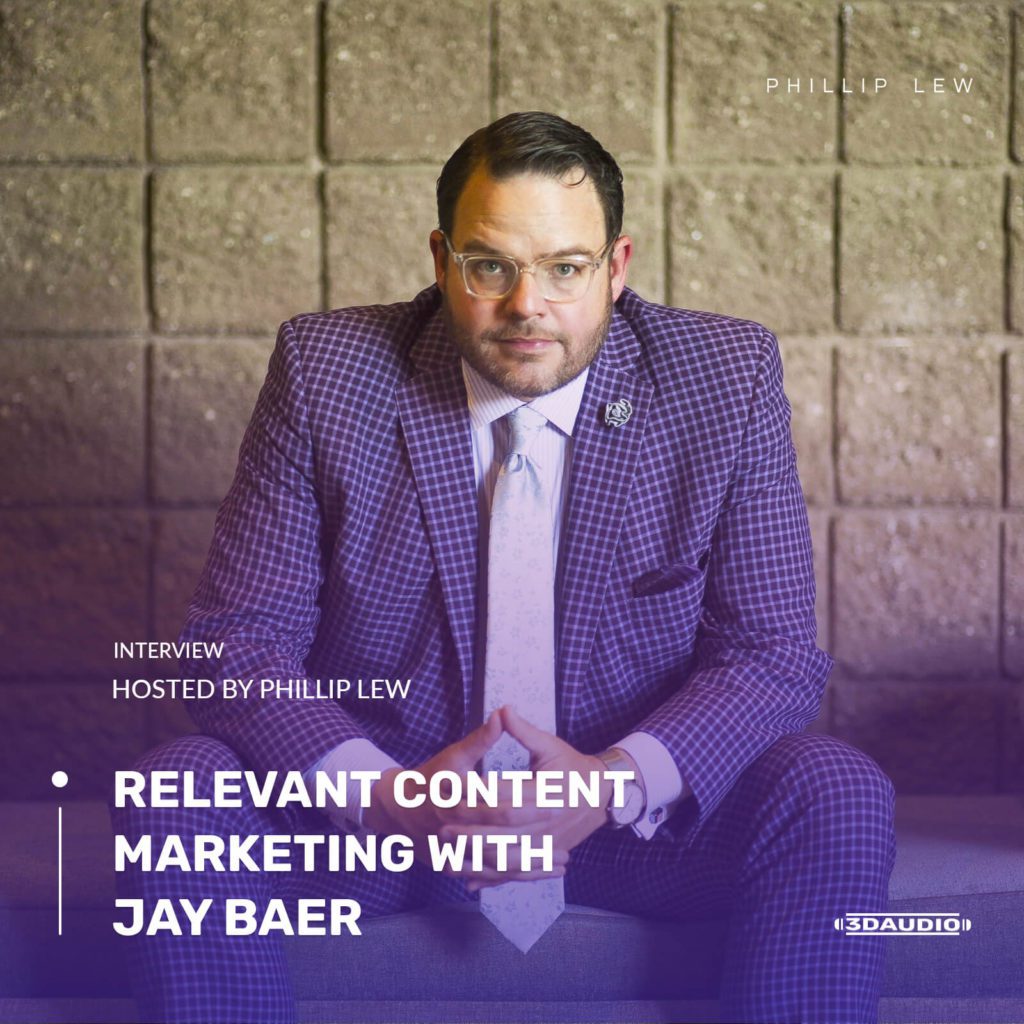
00:00
Paused.
Book Phillip to speak at your next event!
Relevant Content Marketing with Jay Baer
PHILLIP
This divergence empowers business owners and consumers alike. Whether we’re talking about high technology startups like blockchain, all the way to ancient industries like real estate, content marketing allows you to build your business, not by shouting and shoving your company down people’s throats, but by offering relevant, useful advice that can enrich the consumer’s life and create a powerful customer journey with your brand. Yet, it would also seem that for many companies, breaking through the noise, trying to create compelling, engaging, relevant content has been a challenge as more content is published and is competing for valuable human attention.
In 2019, does creating conventional pieces of content, like articles, guides, and white papers, webinars, PDFs, even work anymore? As more content creators enter the space, is it going to become even harder to create engagement, conversion, sales? Can all of us freely participate and succeed as more players enter the global content marketing game?
I’ve decided to invite one of the world’s greatest minds when it comes to content marketing to help us investigate this topic. So pay careful attention as you hear me introduce entrepreneur, Jay Baer, as he chronicles his journey into the dynamic world of content marketing.
JAY
I was 30 when I started my own thing with, you know, my own money where it was really my deal. And I could have done it much earlier. In fact, I wanted to do it much earlier, but I was scared. You know, I was making pretty good money as a marketing manager, marketing executive for different companies. And I was like, “Well, why would I get out of that to start my own thing when I don’t have any certainty whether or not that’s going to work?” and I was just afraid.
And my best friend was diagnosed with cancer, and he called me and said, “Hey, here’s what’s going on,” and I walked in the next day, and I quit. And I’ve never worked for anybody since that day because I realized, “What am I worried about? Like, what’s the worst possible scenario? I start a company, it doesn’t work. I gotta get a job working for somebody else. You know, I’ve got employable skills. Like, what’s really my downside risk here? It’s not like…we’re not talking about cancer here, we’re talking about a job.” So, that unfortunately, under tough circumstances, kind of, gave me the push I needed to take the leap and never looked back.
PHILLIP
JAY
I mean, I’ve written a weekly blog post now every week for 10 years in a row. And I’ve never missed a week. A guy I worked for a once in a company said that success is based on perspiration, not inspiration. think that’s really true, right? This idea that lightning is going to strike or you have this great idea and you’re going to double down on it, doesn’t really work that way, at least not for me, maybe for other people. My thing is, look, if you’re 1% better today than you were a month ago, over time, you’re gonna get somewhere.
But when it comes to kind of “influence”…and I’m throwing up my air quotes here on the podcast…when it comes to influence, I really feel like influence is given, not taken. This idea that you’re gonna go make yourself an influencer doesn’t really work like that. The people decide who they’re influenced by. And yeah, you can create content and do some things to, sort of, help that along, but the way I look at it is go help people. And if you help enough people, eventually, you’ll be an influencer. This idea they’re going to set out to become an influencer, man, your motives are twisted at that point. That’s not what it’s about.
PHILLIP
Was I beginning to really understand how to succeed at content marketing? At this point, I wanted to ask Jay about his blog, Convince & Convert, and how he seemed to always know the right topics to focus on.
JAY
And the reality is we’re a consulting firm, right? We’re a 15-person consulting firm. Now, we do great work for great clients, much more so than most people and all that’s true. But we’re just a consulting firm, right? But we’re a consulting firm that has a blog that’s read by millions of people. So it can be done, you just have to have a really clear idea on who are you writing for, and then you have to produce really good content that’s genuinely valuable every time. And you just do that over and over and over and eventually, good things will happen.
But there’s no shortcut for it, right? You can succeed, but you have to say, “What’s in the market now and how can we do that better?” One of the things I tell people when they’re starting a blog or a podcast or a video show, or any kind of content exercise, is, “Look, this is not actually going to work, unless your podcast is somebody’s favorite podcast in the whole world.” Like, if you can’t be…you don’t have to be everybody’s favorite, you won’t be everybody’s favorite. But if you can’t be somebody’s favorite podcast on the planet, you shouldn’t have a podcast. But you have to have that level of specificity, that level of focus, that level of quality. Otherwise, it’s never really going to succeed.
PHILLIP
JAY
And then the other piece is to understand that relevancy is the killer app. Relevancy is the only thing that matters. If your content isn’t succeeding, it’s not because your audience is too busy…that’s what they tell you right? “No, we’re too busy. We’re too busy to listen to the podcast. We’re too busy to read the white paper. We’re too busy to attend the webinar.” That’s bullshit. If somebody tells you they’re too busy, what they really mean, but just won’t say, is that what you have given them is not relevant enough. They don’t think it’s worth the time.
So the way to succeed in that environment where everybody’s got plenty of content, nobody’s saying, “You know what I wish we could get is more blogs.” Nobody ever says that. What you have to do is start to create content for smaller audiences, right? As I talked about making your podcast somebody’s favorite. If you were going to start a podcast today about entrepreneurship, I would say there’s no way you’re going to succeed, unless you have some kind of crazy secret sauce, where you can get guests that are so much better than anybody else’s or you’re so much better on the microphone.
I would say, “Okay, entrepreneurship is too big of a topic. What do you really know?” “Well, I’ve run a restaurant.” “Okay. Now let’s do a podcast about startup restaurants. Will you come at it from front of the house or back of the house?” “Well, I used to be a chef.” Okay. Your podcast, then, is “Chefs of Brand New Restaurants.” That’s the show, because that’s relevant enough to be somebody’s favorite show.
PHILLIP
JAY
And then the other key piece of it is if you want to be trusted, you have to actually interact with customers good, bad, or indifferent. So, this idea that a lot of businesses will get feedback or criticism or comments or what have you, on Facebook or Instagram or Twitter, Yelp, TripAdvisor, Reddit, discussion boards, and forums, even now, years after I wrote the book, “Hug Your Haters,” a lot of companies, reflexively, just don’t reply. They’re like, “Yeah, our policy is we don’t reply to customer reviews.” What are you talking about? If you don’t reply, it becomes true, whether it’s true or not.
[inaudible 00:14:27], and I talk about it in the book, is that you should respond as much as you can to every mention of your brand in every channel, every time, whether it’s good, bad, 3-star, 5-star, 1-star. Here’s what we said in the book. No response is a response, isn’t it? No response is a response that says, “We care so little about your opinion of our company, that we refuse to even acknowledge it.” And that’s not a way to build trust or gain customers.
The problem is we spend almost nothing on customer service and we spend billions of dollars on marketing. And we probably should take some money out of the marketing budget and put it in the customer service budget. And I say that as a professional marketing consultant.
PHILLIP
I had to ask Jay one last question before the segment was over. So I decided to ask Jay, to tell me his bold prediction of what technology in the future would have the biggest impact on the future of digital marketing and consumer experience.
JAY
We do some work with Oracle, and they’ve got some really interesting apps for field service that use AR where you send somebody out to, you know, repair your refrigerator and the person who comes out to do the repair doesn’t have to be like super, duper refrigerator expert because they can use the app, point it at the refrigerator, and then all the manual show up. And they can click a button and be connected to somebody at the home office who is really, really good at refrigerators, and then do a guided repair and things like that. So, I feel like, ultimately, AR will be the answer.
Over the shorter term, it’s probably AI-powered interfaces, but in addition to chat, which I think is what the question I was referencing, I would also add voice interfaces to that. I think we’re going to see a huge bump in voice-powered customer service, very quickly. Right now everybody’s thinking about Amazon Alexa, Google Home, Siri, etc., for marketing purposes, but we’re going to see a lot more around that water cooler for customer service purposes in the near future.
PHILLIP
Thanks for joining me for another interview segment of Innovators, where your future is now. Jay Bear’s book, “Talk Triggers” can be found on his website at convinceandconvert.com. If you want to learn more about Jay, you can also visit his website at jaybaer.com. You can also listen to the full unedited transcript on our website at c9digital.com. Thanks for joining me again, your host as always, Philip Lew, as we take you, the listener, from a place of panic to power.
OTHER PODCAST EPISODES WE THINK YOU’LL LOVE

About Phillip lew
Phillip Lew is the host of Innovators, a podcast audio experience that decodes the mysteries of exponential technology and the coming singularity. Phillip Lew is also the CEO of C9 Staff—the #1 firm specializing in deploying remote staffing teams for clients across 9 core industries.



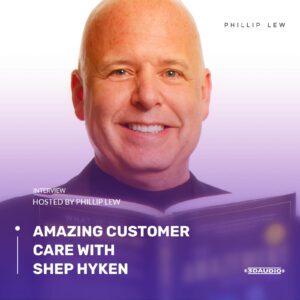


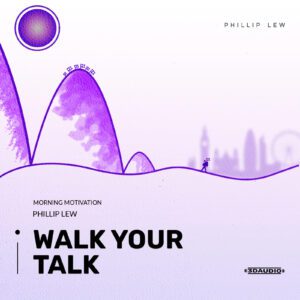

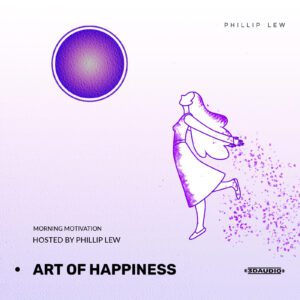

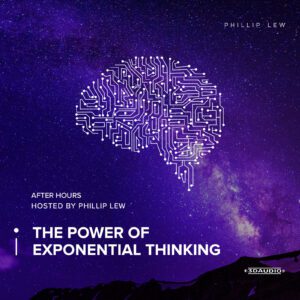
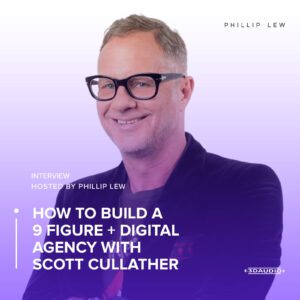

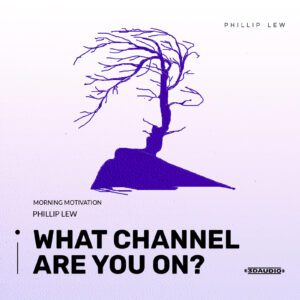
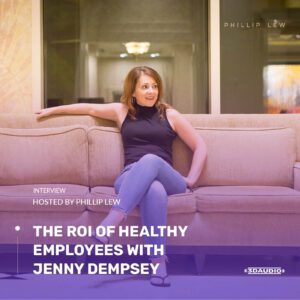
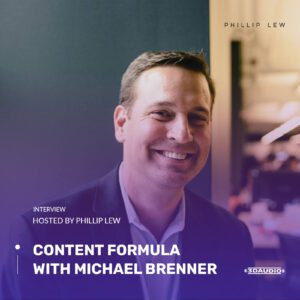
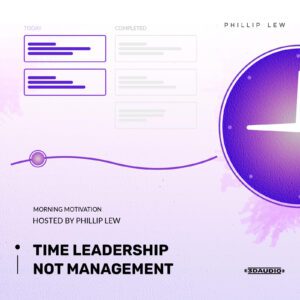
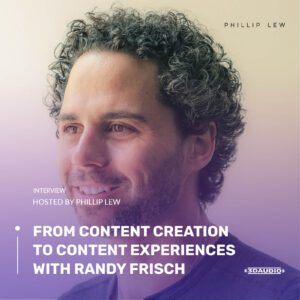
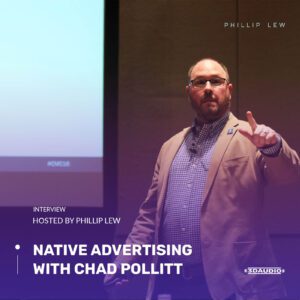

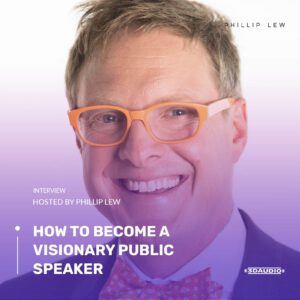
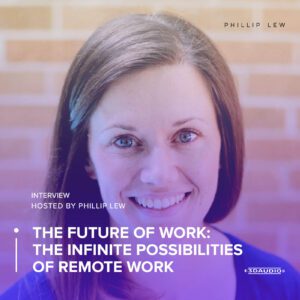
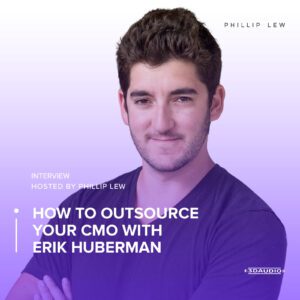
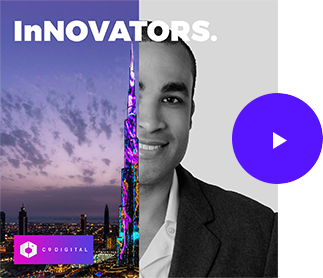
0 Comments